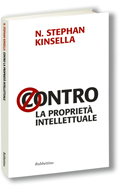 An Italian translation of my Against Intellectual Property was recently published: Contro La Proprietà Intellettuale (edited, translated, and with a preface by Roberta Modugno; Soveria Mannelli: Rubbettino Editore, Nov. 2010).
An Italian translation of my Against Intellectual Property was recently published: Contro La Proprietà Intellettuale (edited, translated, and with a preface by Roberta Modugno; Soveria Mannelli: Rubbettino Editore, Nov. 2010).
Also, the Italian translation of my “What Libertarianism Is” will be included in “Parte Terza: Diritto Naturale e Teoria Politica,” of the forthcoming L’Anarcocapitalismo: Epistemologia, Economia e Teoria Politica [Anarcho-Capitalism: Epistemology, Economics and Political Theory], part of the Nuova Civiltà delle Macchine monograph series edited by Dario Antiseri (one of the major living Italian philosophers). I was asked to prepare an abstract of this piece for the book, which is:
Concepts and ideas such as individual rights, property rights, the free market, capitalism, justice, and the nonaggression principle are not defining characteristics of libertarianism for various reasons–most of them are based on property rights. All political philosophies have some view of property rights; what is distinctive about libertarianism is its particular property assignment rules. This article describes libertarianism’s particular property assignment rules in two cases: for human bodies, the rule is “self-ownership”; in the case of external scarce resources, the property assignment rule is based on Lockean homesteading principles). The article explores how and why these libertarian property assignment rules arise from and are related to the purpose of property rights, which is to permit conflict-free use of scarce resources. The libertarian view is that self-ownership and Lockean homesteading of external resources are the only property assignment rules compatible with more basic grundorms (basic norms of civilized men) such as justice, peace, prosperity, cooperation, and conflict-avoidance, which are adopted in part because of empathy. The article agues that civilized man may be defined as he who seeks justification for the use of interpersonal violence. A consistent application of the basic civilized grundnorms shows that only the libertarian norms, and its non-aggression principle, can be justified. Thus, libertarianism may be said to be the political philosophy that consistently favors social rules aimed at promoting peace, prosperity, and cooperation. It holds that the only rules that satisfy the civilized grundnorms are the self-ownership principle and the Lockean homesteading principle, applied as consistently as possible.
(Other translations of my writings are collected here.)
